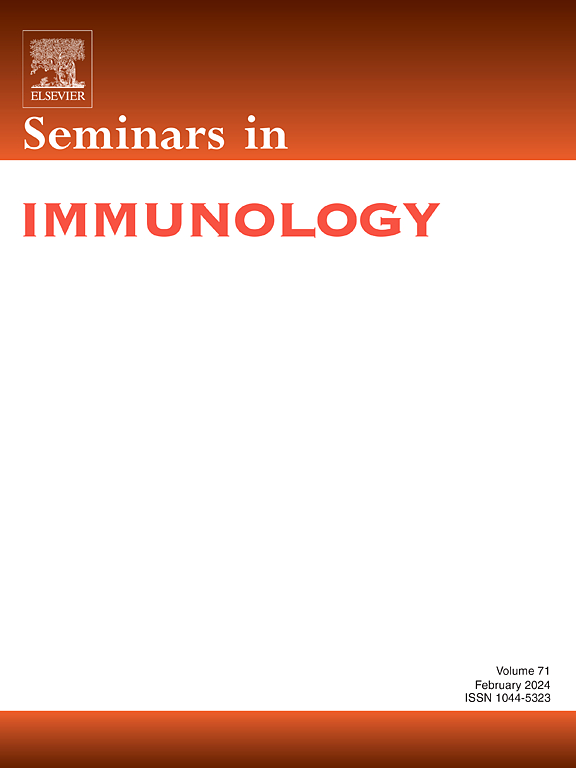Immune dysregulation of diabetes in tuberculosis
IF 7.4
2区 医学
Q1 IMMUNOLOGY
引用次数: 0
Abstract
The rising prevalence of diabetes mellitus (DM) is undermining global efforts to eliminate tuberculosis (TB). Most studies found that patients with pulmonary TB and DM have more cavitary lung lesions, higher mycobacterial burden on the lungs, longer periods of infectiousness, and worse outcomes. Both human and animal studies indicate that TB-DM is associated with impaired innate and adaptive immune responses, resulting in delayed bacterial clearance. Similar observations have been noted in other infections, such as those caused by Klebsiella pneumoniae, where DM contributes to increased susceptibility and worse outcomes due to compromised immune functions including defective phagocytosis and impaired early immune cell recruitment. This review delves into the mechanisms of immune dysfunction in TB-DM, exploring how DM increases TB susceptibility and severity. By elucidating these complex interactions, this review aims to offer insights into more effective strategies for managing and improving outcomes for patients with this challenging comorbidity.
糖尿病在肺结核中的免疫失调
糖尿病(DM)患病率的上升正在破坏全球消除结核病(TB)的努力。大多数研究发现,肺结核和糖尿病患者有更多的空腔性肺病变,肺部的分枝杆菌负担更高,感染期更长,预后更差。人类和动物研究表明,TB-DM与先天和适应性免疫反应受损有关,导致细菌清除延迟。在其他感染中也有类似的观察结果,如肺炎克雷伯菌引起的感染,其中糖尿病导致易感性增加,由于免疫功能受损,包括吞噬功能缺陷和早期免疫细胞募集受损,结果更差。本文将深入探讨TB-DM的免疫功能障碍机制,探讨DM如何增加TB的易感性和严重程度。通过阐明这些复杂的相互作用,本综述旨在提供更有效的策略来管理和改善患有这种具有挑战性的合并症的患者的预后。
本文章由计算机程序翻译,如有差异,请以英文原文为准。
求助全文
约1分钟内获得全文
求助全文
来源期刊

Seminars in Immunology
医学-免疫学
CiteScore
11.40
自引率
1.30%
发文量
50
审稿时长
89 days
期刊介绍:
Seminars in Immunology is a specialized review journal that serves as a valuable resource for scientists in the field of immunology. The journal's approach is thematic, with each issue dedicated to a specific topic of significant interest to immunologists. It covers a wide range of research areas, from the molecular and cellular foundations of the immune response to the potential for its manipulation, highlighting recent advancements in these areas.
Each thematic issue is curated by a guest editor, who is recognized as an expert in the field internationally. The content of each issue typically includes six to eight authoritative invited reviews, which delve into various aspects of the chosen topic. The goal of these reviews is to provide a comprehensive, coherent, and engaging overview of the subject matter, ensuring that the information is presented in a timely manner to maintain its relevance.
The journal's commitment to quality and timeliness is further supported by its inclusion in the Scopus database, which is a leading abstract and citation database of peer-reviewed literature. Being indexed in Scopus helps to ensure that the journal's content is accessible to a broad audience of researchers and professionals in immunology and related fields.
 求助内容:
求助内容: 应助结果提醒方式:
应助结果提醒方式:


